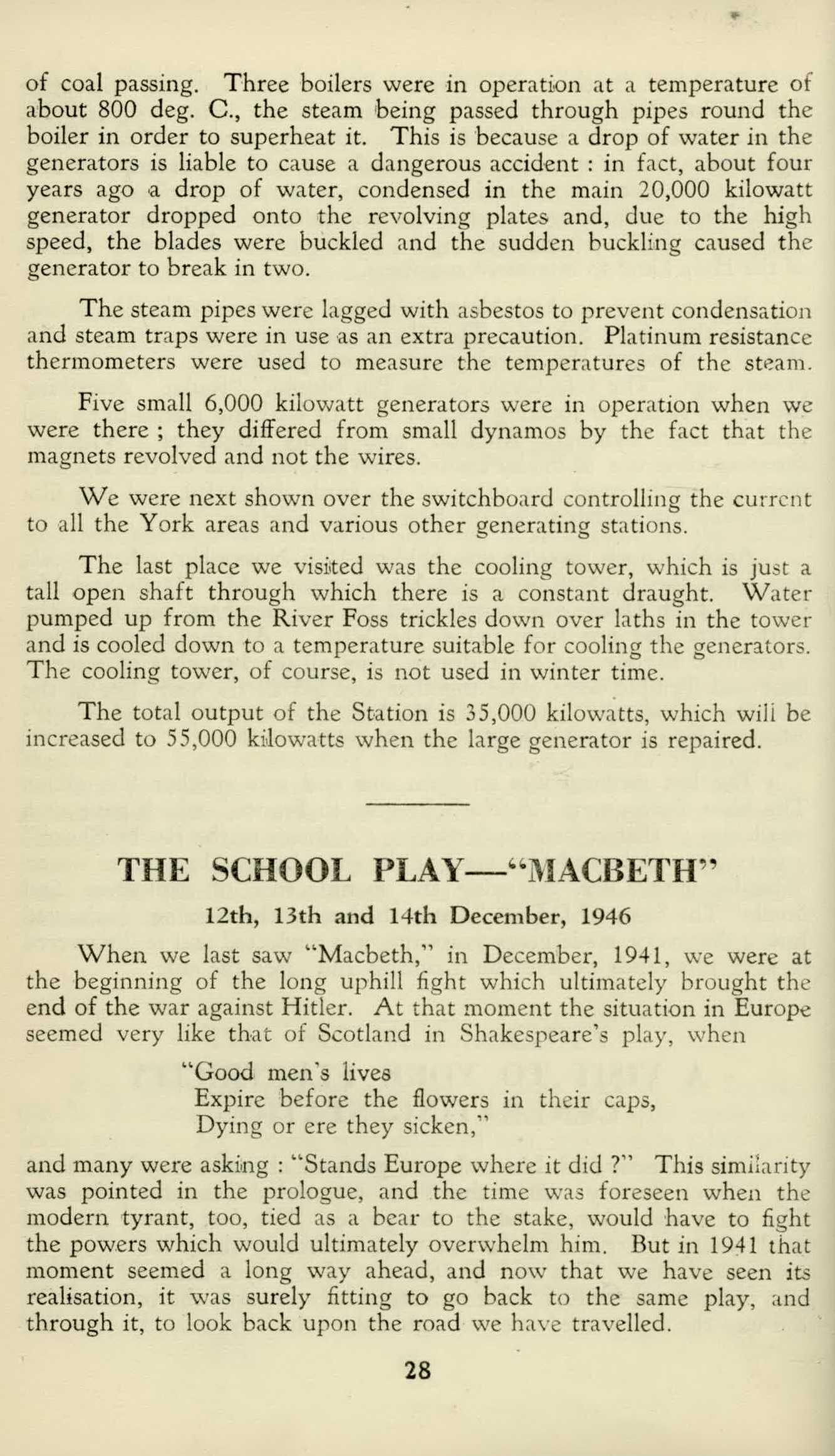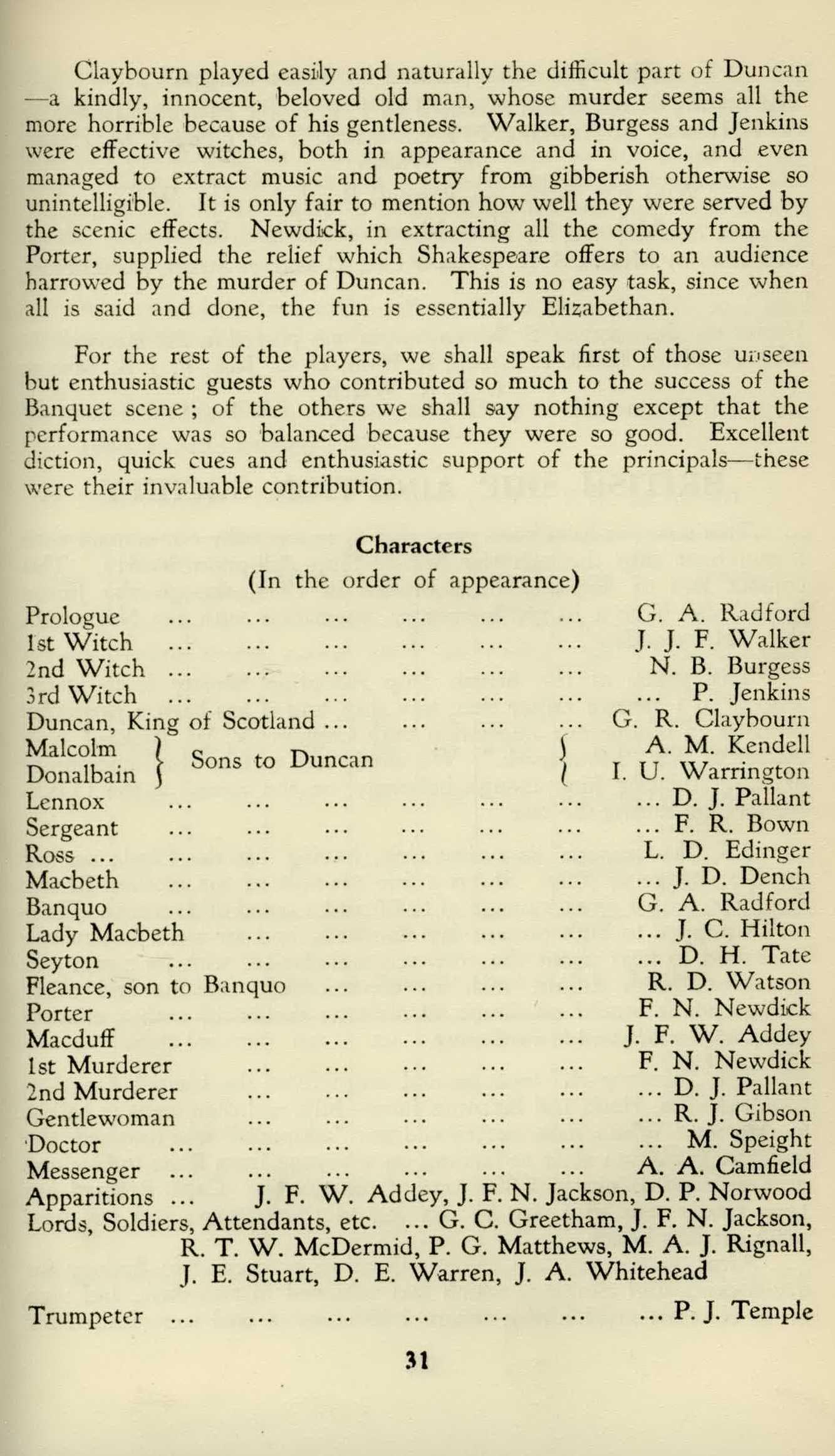
8 minute read
The School Play—Macbeth
from Feb 1947
by StPetersYork
of coal passing. Three boilers were in operation at a temperature of about 800 deg. C., the steam being passed through pipes round the boiler in order to superheat it. This is because a drop of water in the generators is liable to cause a dangerous accident : in fact, about four years ago a drop of water, condensed in the main 20,000 kilowatt generator dropped onto the revolving plates and, due to the high speed, the blades were buckled and the sudden buckling caused the generator to break in two.
The steam pipes were lagged with asbestos to prevent condensation and steam traps were in use as an extra precaution. Platinum resistance thermometers were used to measure the temperatures of the steam.
Five small 6,000 kilowatt generators were in operation when we were there ; they differed from small dynamos by the fact that the magnets revolved and not the wires.
We were next shown over the switchboard controlling the current to all the York areas and various other generating stations.
The last place we visited was the cooling tower, which is just a tall open shaft through which there is a constant draught. Water pumped up from the River Foss trickles down over laths in the tower and is cooled down to a temperature suitable for cooling the generators. The cooling tower, of course, is not used in winter time.
The total output of the Station is 35,000 kilowatts, which will be increased to 55,000 kilowatts when the large generator is repaired.
THE SCHOOL PLAY-"MACBETH"
12th, 13th and 14th December, 1946
When we last saw "Macbeth," in December, 1941, we were at the beginning of the long uphill fight which ultimately brought the end of the war against Hitler. At that moment the situation in Europe seemed very like that of Scotland in Shakespeare's play, when "Good men's lives Expire before the flowers in their caps, Dying or ere they sicken," and many were asking : "Stands Europe where it did ?" This similarity was pointed in the prologue, and the time was foreseen when the modern tyrant, too, tied as a bear to the stake, would have to fight the powers which would ultimately overwhelm him. But in 1941 that moment seemed a long way ahead, and now that we have seen its realisation, it was surely fitting to go back to the same play, and through it, to look back upon the road we have travelled.
28
Essentially, these two productions were the same, both in conception and also in excellence, and it would be wrong to try to compare them. One obvious difference must be mentioned, for whereas in 1941 the stage was open as in Shakespeare's day, this time a front curtain was used with changes of scene. It could be argued that some time was wasted between scenes, and that the 'breaks in the continuity of the play were too frequent and too long—but the beauty of the settings was adequate compensation. One particularly remembers the Witches' Cave and the prospect of blue skies and golden sunshine through the opening in the back—a prospect admirably setting off the grim and murky interior. And the clever arrangement of the Banquet Scene gave an illusion of space and numbers.
Whether the actual script was the same as in 1941, only the producer knows, but we were again conscious of skilful cutting and avoidance of those passages which can be so troublesome to players and to stage-manager, whilst contributing nothing to the development of the play.
As for the players, they gave the expert, polished performance which we have come to expect. Three things were outstanding in it. Firstly, we saw once more a cast in which there was no weak character. This was no performance with two or three outstanding actors working hard to cover the defects of weaker or less experienced players. It was rather the minor characters who worked hard to make even better the excellent acting of the principals. Next we admired the usual high standard of diction in every member of the cast, and particularly, if we may pick out one example from the rest, in Radford's delivery of the lines of the Prologue. And what is even rarer in such productions,, there was an appreciation of the beauty of Shakespeare's poetry. "Macbeth" abounds in lines famous for their beauty : "There's husbandry in heaven, Their candles are all out .. ."

and again : "Light thickens, and the crow Makes wing to the rooky wood ; Good things of Day 'begin to droop and drowse ; Whiles Night's black agents to their preys do rouse These and so many others were given their full value, and awaiting each one eagerly, we were never once disappointed. And lastly we must applaud the smooth flow of the dialogue. Never were we conscious that a cue was awaited, answer and interruption followed naturally and swiftly in a way which spoke of parts carefully learned and rehearsed, and of enthusiasm and interest which must inevitably raise a performance above the ordinary.
29
The play ultimately stands or falls by the acting of Macbeth and Lady Macbeth. Dench was better than in any character he has yet portrayed—as of course he should be, for each year adds to his age and brings fresh experience and confidence. He has a fine feeling for language, and his voice was better than ever. Moreover, his understanding of the dramatic significance of Macbeth's character enabled him to convey with perfect skill and confidence the varying moods from "vaulting ambition" to guilty fear, from fierce impatience : "The Devil damn thee black, thou cream-fac'd loon !" to the black despair which follows immediately : "I have lived long enough ; my way of life Is fall'n into the sear, the yellow leaf : . . ." and the pathos of "She should have died hereafter . . ."
And that difficult meeting with Lady Macbeth at the beginning of the play was given its full dramatic weight by both Dench and Hilton.
Hilton upheld his reputation with a fine performance. Lady Macbeth is no easy part to play, but there was little fault to find with this. He uses a good voice so well that we were able to overlook an occasional stiffness in his movements and gestures which would otherwise have reminded us that it was really a boy beneath the habit of this ambitious woman. In repose he was excellent, and he came perfectly through his most difficult tests—the sleepwalking and the banquet scenes.
It is often argued that Banquo is a villain. As Radford portrayed him, he was not : his was a kindly, dignified and gentle Banquo, as conscious as Macbeth of the implications of the Witches' prophecies, but, unlike Macbeth, determined to let things take their course, keeping "his bosom franchised and allegiance clear." Here again was a good voice beautifully used, and exploiting to the full the many good lines which Shakespeare puts into the mouth of Banquo. Radford's was a most sympathetic study.
Addey might easily have found his lack of height a handicap, playing Macduff against a Macbeth and a Banquo both taller than he. But having feared this, we did not notice it. He was a most forceful and vigorous Macduff ,(as Shakespeare intended he should be), voice, facial expression and posture all cleverly contributing to a fine performance. Nor was poetry missing : "What ! all my pretty chickens and their darn At one fell swoop?"

Claybourn played easily and naturally the difficult part of Duncan —a kindly, innocent, beloved old man, whose murder seems all the more horrible because of his gentleness. Walker, Burgess and Jenkins were effective witches, both in appearance and in voice, and even managed to extract music and poetry from gibberish otherwise so unintelligible. It is only fair to mention how well they were served by the scenic effects. Newdick, in extracting all the comedy from the Porter, supplied the relief which Shakespeare offers to an audience harrowed by the murder of Duncan. This is no easy task, since when all is said and done, the fun is essentially Elizabethan.
For the rest of the players, we shall speak first of those unseen but enthusiastic guests who contributed so much to the success of the Banquet scene ; of the others we shall say nothing except that the performance was so balanced because they were so good. Excellent diction, quick cues and enthusiastic support of the principals—these were their invaluable contribution.
Characters (In the order of appearance)
Prologue 1st Witch 2nd Witch 3rd Witch ... ... ... Duncan, King of Scotland ... Malcolm I Donalbain Sons to Duncan

Lennox ... Sergeant ... Ross ... Macbeth Banquo ... Lady Macbeth ... Seyton ... ... Fleance, son to Banquo Porter ... ... G. A. Radford J. J. F. Walker N. B. Burgess ... P. Jenkins G. R. Claybourn i I A. M. Kendell I. U. Warrington ... D. J. Pallant ... F. R. Bown L. D. Edinger ... J. D. Dench G. A. Radford ... J. C. Hilton ... D. H. Tate R. D. Watson F. N. Newdick
Macduff ... 1st Murderer J. F. W. Addey F. N. Newdick
2nd Murderer Gentlewoman
... D. J. Pallant ... R. J. Gibson Doctor ... ... M. Speight Messenger ... ... ... ... ... ... A. A. Camfield Apparitions ... J. F. W. Addey, J. F. N. Jackson, D. P. Norwood Lords, Soldiers, Attendants, etc. ... G. C. Greetham, J. F. N. Jackson, R. T. W. McDermid, P. G. Matthews, M. A. J. Rignall, J. E. Stuart, D. E. Warren, J. A. Whitehead Trumpeter ... ... P. J. Temple










